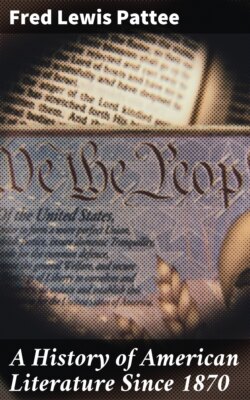Читать книгу A History of American Literature Since 1870 - Fred Lewis Pattee - Страница 12
На сайте Литреса книга снята с продажи.
CHAPTER II
THE LAUGHTER OF THE WEST
ОглавлениеTable of Contents
American literature from the first has been rich in humor. The incongruities of the new world—the picturesque gathering of peoples like the Puritans, the Indians, the cavaliers, the Dutch, the negroes and the later immigrants; the makeshifts of the frontier, the vastness and the richness of the land, the leveling effects of democracy, the freedom of life, and the independence of spirit—all have tended to produce a laughing people. The first really American book, Irving's Knickerbocker's History of New York, was a broadly humorous production. The mid period of the nineteenth century was remarkably rich in humor. One has only to mention Paulding and Holmes and Saxe and Lowell and Seba Smith and B. P. Shillaber. Yet despite these names and dozens of others almost equally deserving, it must be acknowledged that until the Civil War period opened there had been no school of distinctly American humorists, original and nation-wide. The production had been sporadic and provincial, and it had been read by small circles. The most of it could be traced to older prototypes: Hood, Thackeray, Lamb, Douglas Jerrold, Dickens. The humor of America, "new birth of our new soil," had been discovered, but as yet it had had no national recognition and no great representative.
As late as 1866, a reviewer of "Artemus Ward" in the North American Review, published then in Boston, complained that humor in America had been a local product and that it had been largely imitative. It was time, he declared, for a new school of humorists who should be original in their methods and national in their scope. "They must not aim at copying anything; they should take a new form. … Let them seek to embody the wit and humor of all parts of the country, not only of one city where their paper is published; let them force Portland to disgorge her Jack Downings and New York her Orpheus C. Kerrs, for the benefit of all. Let them form a nucleus which will draw to itself all the waggery and wit of America."[14] It was the call of the new national spirit, and as if in reply there arose the new school—uncolleged for the most part, untrained by books, fresh, joyous, extravagant in its bursting young life—the first voice of the new era.
The group was born during the thirties and early forties, that second seedtime of American literature. Their birth dates fall within a period of ten years:
| 1833. | David Ross Locke, "Petroleum V. Nasby." |
| 1834. | Charles Farrar Browne, "Artemus Ward." |
| 1834. | Charles Henry Webb, "John Paul." |
| 1835. | Samuel Langhorne Clemens, "Mark Twain." |
| 1836. | Robert Henry Newell, "Orpheus C. Kerr." |
| 1839. | Melvin DeLancy Landon, "Eli Perkins." |
| 1841. | Thomas Nast. |
| 1841. | Charles Heber Clark, "Max Adler." |
| 1841. | James Montgomery Bailey, "The Danbury News Man." |
| 1841. | Alexander Edwin Sweet. |
| 1842. | Charles Bertrand Lewis, "M. Quad." |
To the school also belonged several who were born outside of this magic ten years. There were Henry Wheeler Shaw, "Josh Billings," born in 1818; and Charles Henry Smith, "Bill Arp," born in 1823. At least three younger members must not be omitted: Robert Jones Burdette, 1844; Edgar Wilson Nye, "Bill Nye," 1850; and Opie Read, 1852.
